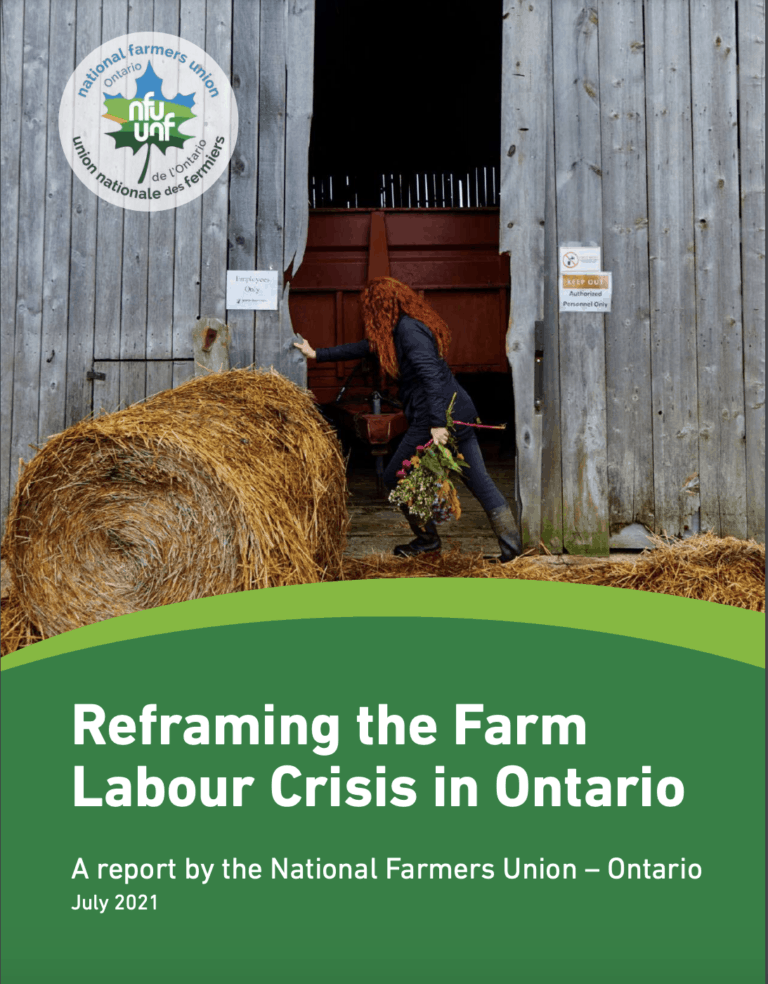Executive Summary
Growing concerns over a “farm labour crisis” or “farm labour shortage” have not taken into account the unique labour conditions on small and mid-sized farms. There is a need to reframe the discussion on the farm labour crisis to better understand how labour shortages are felt and understood within smaller operations compared with large agribusinesses. The voices of agriculturalists committed to creating local, just, and sustainable food systems are too often drowned out by corporate lobbyists.
In April 2020, the NFU-O embarked on a Farm Labour Project to study agricultural labour issues on small and mid-sized farms. The following report and recommendations are based on a mixed methods study that included a survey of 772 farm operators and workers, stakeholder consultations, informal interviews, online group discussions, and a literature review.
The study found that small to mid-sized farms are robust agricultural job creators. In fact, farms under 70 acres were more likely to employ Ontarians than their larger counterparts. Temporary Foreign Workers make up only 8.5% of the workforce on small and mid-sized farms compared to 30% across the entire sector. Many of the farms surveyed provide extensive farm training and are the knowledge incubators for the next generation of farmers. There is plenty of work on these farms, and plenty of people are attracted to the work and the rural lifestyle.
There is, however, a shortage of living-wage agricultural jobs which has led to a scarcity of skilled and experienced workers.
The reasons for a shortage of living-wage agricultural jobs are complicated. A farm income crisis has left small and mid-sized producers with little take-home income to pay themselves, let alone their essential workforce. After thirty years of free trade agreements, a capitalist global food system has decreased the market value of many agricultural commodities and ultimately set the wage floor to the lowest paid farm workers in the world. Partial exemptions under Ontario labour law have excluded agricultural workers from minimum wage laws and other key labour protections. Under these conditions, it is no wonder why many Ontarians are reluctant to perform highly skilled, physically demanding, lowpaid agricultural work.
Without living wages/incomes we are unlikely to attract enough Ontarians willing to acquire the skills and dedicate their lives to agricultural production.
If we want to open the doors to living-wage jobs and increase farm incomes in Canadian agriculture without tariffs or other protective market mechanisms, then even more government support is needed. Farm labour grants and wage subsidies, improved access to EI, and ideally a Basic Income are urgently required to ensure farm workers and operators are receiving a decent annual income regardless of their hourly wage, farm earnings, or the length of their season.
Common values and a positive team culture on Ontario’s small and mid-sized farms have continued to attract aspiring farmers. But they are unlikely to stay or become the next generation of farm operators unless we deal with the financial precarity of those who grow our food.
The recommendations arising from the NFU-O Farm Labour Project are clustered in two sections. The first, “Building Farm Employer and Farm Worker Capacity,” suggests measures that farmers, farm organizations, community groups, eaters, and other stakeholders can take to support and grow Ontario’s agricultural workforce.
The second, “Municipal, Provincial, and/or Federal Support and Legislation,” provides key policy recommendations directed at elected officials and all levels of government. The implementation of these policies will support the essential work of Ontario’s small and mid-sized farms.
A full list of recommendations can be found below.
Contact
If you have any questions, or would like to know more about this report, please contact Dave Thompson at david@nfuontario.ca.
Click here to read the report: Reframing-the-Farm-Labour-Crisis-NFU-O-Farm-Labour-Study_compressed
Recommendations
Building Farm Employer and Farm Worker Capacity
- Provide Human Resources (HR) Training for Farm Operators: Though they are experts in growing food and managing livestock, small and mid-sized farm operators often do not have the time, or the knowledge, to adequately hire, manage, and retain workers. Offering farm operators specific training in working with staff and providing related templates and resources tailored to the needs of small and mid-sized farms would benefit operators and workers by fostering healthy, transparent, accountable, and safe workplaces.
- Promote Best Practices for Farm Employers: A majority of farm operators and workers stressed that matching farm values, and a good management style or team culture creates a positive and attractive work environment. On-farm meals and free or discounted produce were also strong enticements for new and returning workers. Although few farms offered profit-sharing/ ownership stakes or a supplementary health and dental plan, workers shared that such practices would play a factor in their pursuit of a long-term agricultural career. Promoting these and other “best practices” and encouraging their adoption on other farms will help small and mid-sized farmers attract Ontarians who are motivated by factors beyond financial remuneration.
- Fund Training Programs for New Farmers and Farm Workers: Over 70% of farm workers acquired their agricultural skills from on-farm training. Training and educational offerings are especially prevalent on rural small and mid-sized farms and on urban non-profit community farms. Novel programs like Ignatius Farm’s online New Farmer Training Program currently lack stable funding in spite of meeting a real need in the agricultural sector.
- Support Co-operative Initiatives: Less than 5% of farms surveyed were co-operatives, but almost 13% would consider forming a cooperative. Over 48% of workers were interested in co-operative farming opportunities. Given the financial constraints on farm operators and staff, it is recommended that farm organizations work closely with Local Food and Farm Co-ops (LFFC) to support farmers wishing to start or transition to co-operative models.
- Improve Farmland Protection and Access: The need to protect farmland from development and protect small and mid-sized farms from being absorbed by large corporate agribusinesses is crucial to addressing the farm income and living-wage farm labour crises. Mortgage and debt payments create barriers for farmers to hire. Over 64% of farm workers shared that skyrocketing land prices are preventing them from accessing land. Black, Indigenous, and people of colour (BIPOC) face additional barriers to accessing land and achieving food sovereignty for their communities. Allying with the Ontario Farmland Trust and generating land-linking, land-sharing, and succession opportunities between retiring and aspiring farmers will help protect farmland and create pathways for experienced agricultural workers to become the next generation of farmers.
- Organize All Farm Workers under the Agricultural Employee Protection Act (AEPA): Almost three-quarters of farm operators were in favour of granting farm workers the right to unionize. Although the AEPA only grants workers the right to associate, it is recommended that union-friendly farm employers encourage their staff to associate under the AEPA and that farm workers on small and mid-sized farms develop relationships with fellow labourers in corporate agriculture, and work with the UFCW and migrant rights groups to build their collective strength. A unified voice for workers will strengthen capacity to promote shared interests in fair wages, local food, food security, land stewardship, and healthy livelihoods for all.
- Increase Consumer Awareness of the Undervaluing of Agricultural Labour: During the pandemic, many Ontario consumers realized that agricultural labour was essential skilled work. Almost two-thirds of farm operators and agricultural workers would like politicians, farm organizations, and other stakeholders to support a popular movement promoting fair food prices to mitigate farm income insecurity and low pay.
Municipal, Provincial, and/or Federal Support and Legislation
- Increase and Enhance Farm Labour Grants for Small and Mid-sized Farm Operations: Approximately 40% of both farm operators and workers think that government should prioritize increasing and extending access to farm labour grants and subsidies. Many called for the extension of age qualifications and contract durations for Canada Summer Jobs (CSJ) and the Youth Employment and Skills Program (YESP). Some respondents also wished to see the CSJ and YESP provide a “living wage” and not just the Ontario minimum.
- Overhaul Temporary Foreign Worker Programs: Over two-thirds of farm operator respondents agree with migrant-led movements on the need for permanent status for migrant workers. There is a strong contingent of farmers who are keen to see a variety of labour rights extended to TFWs.
- Enact Universal Paid Sick Days: Labour disruptions owing to the COVID-19 pandemic made it clear to farm operators and workers of the need for permanent paid sick days for all workers, including farm operators.
- Offer a Basic Income (BI): Almost 37% of farm operators and 67% of farm labourers consider a BI to be a top priority to protect farm workers and operators from financial insecurity. In the absence of protective market mechanisms, a BI would be one of the most effective ways to ensure a decent annual income regardless of hourly wages, farm earnings, or the seasonality of production.
- Improve Employment Insurance (EI) Access: Resident and migrant farm workers alike pay into EI through payroll deductions, but they either have difficulty accessing or are barred from accessing this benefit. Decreasing the insurable hours for farm workers to qualify for EI access and extending EI to migrant workers, even after they have left Canada for the season, would fairly offer workers needed income insurance.
- Ease Building Codes to Support On-Farm Housing: Over 38% of farm workers and 26% of farm employers called on county and municipal governments to ease building codes that limit on-farm housing, while maintaining regulations to prevent large developments on agricultural-zoned land.

